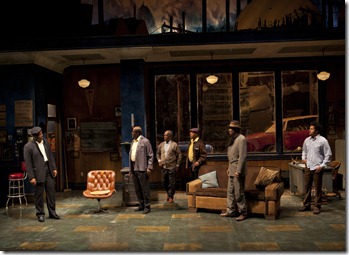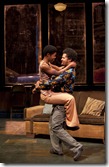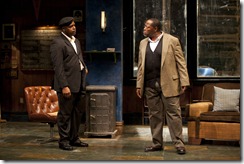I'd bet that the predominantly white audience of senior citizen theater lovers who attended the performance of August Wilson's Jitney at Two River Theater on Super Bowl Sunday—and I was one of them—thought they’d learn more about the African-American experience in 1970s Pittsburgh, but the rousing standing ovation they gave the actors and the play made it clear that they had connected with the characters and situations in ways that transcended race. For this is a play, ultimately, about the human race, showing us that we are more alike than different.
 The first of ten plays in Wilson's monumental Pittsburgh cycle, Jitney covers a week in the lives of four drivers in a gypsy cab company owned by Becker. Also present in the office are his son Booster (recently released from prison after serving a 20-year term for murder); the numbers runner Shealy; hotel doorman Philmore who comes around from time to time, often drunk; and Rena, accounting student and the mother of the youngest driver Youngblood's two-year-old son. As the phone rings intermittently and men pop in and out to pick up a fare, a cloud hangs over what appears to be a rather tenuous business: the city has slated the neighborhood for urban renewal and "the man" is coming very soon to board up the place, forcing Becker to relocate or close, leaving five men without work and without a paycheck.
The first of ten plays in Wilson's monumental Pittsburgh cycle, Jitney covers a week in the lives of four drivers in a gypsy cab company owned by Becker. Also present in the office are his son Booster (recently released from prison after serving a 20-year term for murder); the numbers runner Shealy; hotel doorman Philmore who comes around from time to time, often drunk; and Rena, accounting student and the mother of the youngest driver Youngblood's two-year-old son. As the phone rings intermittently and men pop in and out to pick up a fare, a cloud hangs over what appears to be a rather tenuous business: the city has slated the neighborhood for urban renewal and "the man" is coming very soon to board up the place, forcing Becker to relocate or close, leaving five men without work and without a paycheck.
The men squabble incessantly, with busybody Turnbo sticking his nose into everyone's business and giving his opinion on everything and anything that strikes his fancy. His revelations stir up a hornet's nest between Youngblood and his girl, Rena. The two men come to blows, with Turnbo almost taking more drastic action. Becker keeps the peace, but the arrival of his son, whom he has seen but once in 20 years, upends his world, reflecting on his reputation and, in a final momentous conversation, his own vision of himself.
Before I address the acting and directing, Two River Theater Company is to be congratulated on their always-outstanding production values. Neil Patel's set captures just the right amount of seediness of the cab dispatch "office," with a car visible through a large plate glass window, some mismatched furniture and the ringing wall phone. Karen Perry's costumes are equally as excellent; each character wears clothing appropriate to who he (and she) is. Turnbo favors pastel-colored cardigan sweaters; Shealy looks especially cool in a brown pinstriped suit with an orange hat and shoes; Fielding, although usually drunk, sports a double-breasted suit and tie (even if it is rumpled); Doub wears suspenders, Youngblood jeans and Hawaiian shirts, Becker a suit, and Booster the cheap suit issued to him when he was released from the pen. These characters are dressed with style and dignity to show that they are upstanding, hardworking citizens. Rui Rita's lighting conveys the passage of time and the various hours of the day very well.
 That said, director Ruben Santiago-Hudson's cast does great justice to Wilson's work. As the owner of the jitney cab company, Chuck Cooper's Becker is a fine executorial presence. He may not command a boardroom, but the men look to him for guidance and solutions. And he cares for them like a mother hen. Anthony Chisolm (right) originated the role of Fielding in the play's first Off-Broadway production, so the part fits him like a second skin, with his raspy voice and slurred delivery (remember: he's drunk most of the time). Harvy Blanks' Shealy is a combination of sass and slickness; such is his character's good nature that the stage brightens whenever he appears. As Doub, James A. Williams provides equanimity and gravity to keep a lid on some of the volatile relationships, especially between Turnbo and
That said, director Ruben Santiago-Hudson's cast does great justice to Wilson's work. As the owner of the jitney cab company, Chuck Cooper's Becker is a fine executorial presence. He may not command a boardroom, but the men look to him for guidance and solutions. And he cares for them like a mother hen. Anthony Chisolm (right) originated the role of Fielding in the play's first Off-Broadway production, so the part fits him like a second skin, with his raspy voice and slurred delivery (remember: he's drunk most of the time). Harvy Blanks' Shealy is a combination of sass and slickness; such is his character's good nature that the stage brightens whenever he appears. As Doub, James A. Williams provides equanimity and gravity to keep a lid on some of the volatile relationships, especially between Turnbo and  Youngblood. The latter is played by Brandon J. Dirden (left) as a Vietnam vet with smarts and dreams; you really root for him to leave the life of a cabdriver for something more fulfilling and financially secure. This hope is conveyed through the ambition of Rena, played by Roslyn Ruff (left) with a mixture of exasperation at what she thinks is his philandering and a desire for a future with this young man. As Philmore, Ray Anthony Thomas wanders in from time to time to let us know that not everyone in this neighborhood drives a cab; he's especially spiffy in his doorman's uniform.
Youngblood. The latter is played by Brandon J. Dirden (left) as a Vietnam vet with smarts and dreams; you really root for him to leave the life of a cabdriver for something more fulfilling and financially secure. This hope is conveyed through the ambition of Rena, played by Roslyn Ruff (left) with a mixture of exasperation at what she thinks is his philandering and a desire for a future with this young man. As Philmore, Ray Anthony Thomas wanders in from time to time to let us know that not everyone in this neighborhood drives a cab; he's especially spiffy in his doorman's uniform.
 And finally, J. Bernard Calloway's magnificent portrayal of Booster (left in photo to right) tears at your heartstrings, for this 39-year-old ex-con was once the embodiment of every Hill District citizen's dreams, with a college scholarship and a bright future that ended with a bullet from his gun. His troubled relationship with his father (to the right) is extremely sad, for each has disappointed the other, badly.
And finally, J. Bernard Calloway's magnificent portrayal of Booster (left in photo to right) tears at your heartstrings, for this 39-year-old ex-con was once the embodiment of every Hill District citizen's dreams, with a college scholarship and a bright future that ended with a bullet from his gun. His troubled relationship with his father (to the right) is extremely sad, for each has disappointed the other, badly.
On the surface, Jitney appears to be about the African-American experience, but its themes of family, parent-child relationships and the fulfillment of the American Dream (or lack thereof) resonate with all races and ethnic groups. August Wilson's fluent dialogue and deft manipulation of dramatic conflict make for a satisfying introduction to the Pittsburgh cycle of 10 plays—one for each decade of the 20th century—that he wrote before his death in 2005. Once you've seen this production, I guarantee you'll want to see more, wherever they are produced.
Jitney will be performed at the Two River Theater, 21 Bridge Street, Red Bank, through February 19. For information and tickets, call the box office at 732.345.1400 or visit online at www.trtc.org.
Photos by T. Charles Erickson